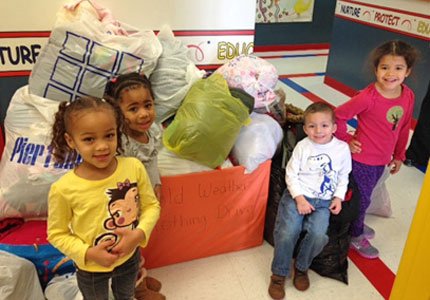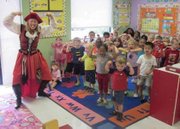BALTIMORE — Late in 2015, the Baltimore Community Foundation announced a $6 million contribution towards the expansion of Judy Centers to help provide early childhood education and support services to 5,000 Baltimore City children and their families. At the time, a goal was set to have 90 percent of preschool-aged children ready for school in Baltimore by 2017.
The percentage of Baltimore children measured as school-ready grew from 28 percent in 2002 to 76 percent in 2013. According to the 2013 Maryland Measurement of School Readiness, between 85 and 93 percent of children with a Judy Center or early childhood education experience in Baltimore City, were ready for kindergarten at age five, compared with 76 percent of children citywide.
“We strongly believe that the only way our society is going to succeed over the long term is to ensure that every child, regardless of economic standing, has the same opportunity for an excellent education,” said George Sherman, a local philanthropist who, with his wife Betsy, also provided significant funds for Judy Centers in Baltimore.
The importance of early childhood education can easily be seen in numbers— Ready at Five, a statewide organization dedicated to elevating school readiness for all Maryland children in partnership with the Maryland State Department of Education/MSDE, has found that just 45 percent of students demonstrate the skills and behaviors needed to fully participate and succeed in kindergarten and that the skills and knowledge children have upon entering school are strongly predictive of future academic success and children, who enter kindergarten behind their peers, are unlikely to catch up.
Further, they found that children that enter school at higher levels of readiness, are healthier and are less likely to become involved with the criminal justice system and drop out of school.
These children experience higher levels of education and typically have higher earnings throughout their lives. Finally, Ready at Five found that children that attend Pre-K programs are better prepared for school than those in home or informal care the year prior to starting kindergarten.
The importance of an early childhood education was further underscored when, on August 13, 2016, Celebree Learning Centers, a dedicated leader in early childhood education and development, hosted its annual open house at all 22 its locations in Maryland.
“A lot of research of the brain and neurology show that the first five years are formidable,” said Lisa Henkel, CEO of Celebree Learning Centers, whose locations include Annapolis and Baltimore.
“The biggest challenge we face is public perception. People tend to believe it’s about babysitting and play time, but early childhood education and what we do at Celebree is about building an education foundation and maintaining educational milestones,” she said.
The center’s preschool curriculum, which is aligned with the Maryland State Department of Education’s focus on early childhood education, is designed to cover each kindergarten readiness milestone, according to Henkel.
Celebree’s mission is to provide a stable and secure learning environment that helps foster a solid foundation for lifelong success and center officials have a vision to be the recognized leader in providing the best care for infants, preschool and school-age children.
Teachers at the center are dedicated instructors who make a habit of going above and beyond the call of duty for the children they teach, officials said.
They also realize some of the challenges that may hold some back from an early education.
“We know quality care isn’t cheap and when parents are looking at expenses, your child care expense is only second to your mortgage and that could be a challenge to find the funds to participate,” Henkel said. “It’s a national challenge that’s not unique to just Baltimore and Annapolis.”
Henkel says it’s important that parents realize the importance of the centers.
“We want them to know it’s important. At Celebree, play is important too and parents should know that what we provide is purposeful play,” she said.
“The exposure children are having from their earliest moment are important and formative,” Henkel said. “We are now at a point in studies that are 25 and 30 years long which show that when children are exposed to an early childhood education program they do better. They don’t have the lags and gaps of development and they have less involvement with the criminal justice system.”

